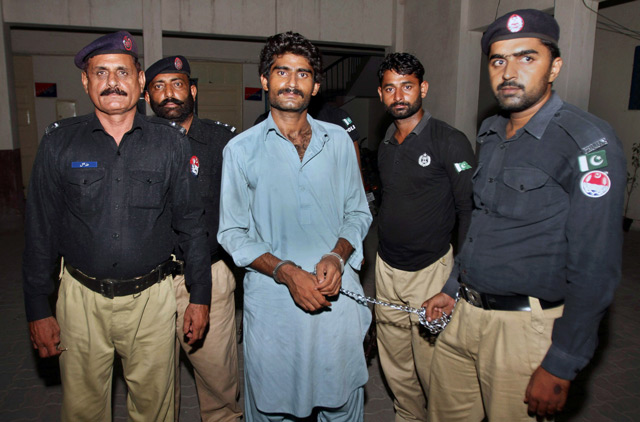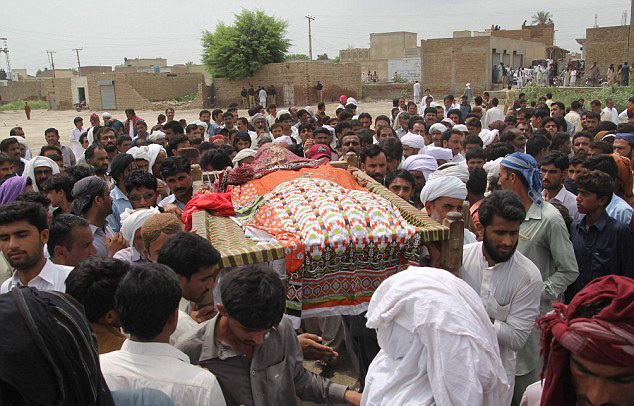- City Fajr Shuruq Duhr Asr Magrib Isha
- Dubai 04:26 05:44 12:20 15:47 18:50 20:08

Qandeel Baloch (Instagram)
Pakistani authorities have barred the family of a murdered social media celebrity from legally 'forgiving' their son for strangling her, sources said, in a rare stand against the so-called practice of 'honour killings'.
Muhammad Waseem drugged and strangled Qandeel Baloch on Friday in a murder that has shocked Pakistan, a deeply conservative Muslim nation where the 26-year-old both titillated and outraged with her risqué social media photos and videos.

AFP
Waseem told media he had 'no regrets' about killing his sister as she violated the family's honour by her social media pictures, including 'selfie' photographs with prominent Muslim cleric Abdul Qavi.
In a video post with Qavi, she appears to sit on his lap.
A police source said the government of Punjab, the country's largest province, has made it impossible for the family to forgive the son who murdered her - a common legal loophole that sees many honour killings go unpunished in Pakistan.
"It was done on the instructions of the government. But it happens rarely," said the Punjab police official.

AFP
A senior government official in Islamabad confirmed the order came from the Punjab government.
More than 500 people, almost all of them women, die in honour killings in Pakistan every year, usually at the hands of relatives acting over a perception shame has been brought on the family.
It was not immediately clear if the Punjab government's decision would lead to any meaningful reforms. An anti-honour killings bill that aims to close the family forgiveness loophole has been bogged down in parliament.
Prime Minister Nawaz Sharif in February promised to speed up the passage of the proposed law but right groups say there has been no progress.
"There is no honour in killing in the name of honour," Sharif said about Baloch's murder, according to his daughter, Maryam.
Baloch's father, Muhammad Azeem, has filed a police complaint against Waseem and another one of his sons for their role in Baloch's murder.
Police on Monday also said they were widening their investigations to include Qavi, the Muslim cleric who was removed from a prominent Muslim committee after the selfie photos were published. He has denied any wrongdoing.
Baloch built a modelling career on the back of her social media fame and was the family breadwinner.
Media often described her as Pakistan's Kim Kardashian and she called herself a modern-day feminist.
But her pictures and videos outraged conservatives who viewed her as a disgrace to the cultural values of Pakistan. She often received death threats.

'No Country for Bold Women'
A vigil held late Saturday in Lahore was attended by dozens of mourners, while an online petition entitled 'No Country for Bold Women' and demanding accountability over Baloch's death has gained momentum.
A scathing editorial in Pakistan's biggest English-language newspaper 'Dawn' said her murder must serve as "impetus" for anti-honour killing legislation.
It lauded Baloch for "breezily" pushing the boundaries of what Pakistan considers "acceptable" behaviour for women, saying her determination to live on her own terms was "in itself an act of courage".
Some of Baloch's more notorious acts included volunteering to perform a striptease for the Pakistani cricket team, and donning a plunging scarlet dress on Valentine's Day.
She also posed for selfies with a high-profile mullah in an incident that saw him swiftly rebuked by the country's religious affairs ministry.

She told local media she had received death threats in the wake of the controversy, and that her requests for protection from authorities had been ignored.
Initially dismissed, she was seen by some as empowered in a country where women have fought for their rights for decades.
In her final Facebook post on July 4, she wrote how she was trying to "change the typical orthodox mindset of people", and thanked her supporters for "understanding the message i (sic) try to convey through my bold posts and videos".
"Qandeel was an extremely astute individual who knew that what she was doing was more than being the most loved bad girl of Pakistan," columnist and activist Aisha Sarawari told AFP.
Her killing "defines yet another setback for the women of our generation... This makes it harder for women. Period".
"Many in Pakistan have laid blame for her death on her bold and provocative public acts," noted Benazir Jatoi, who works with the Aurat Foundation, a local NGO working on women's legal and political empowerment.
"Qandeel has put a face to the countless ordinary Pakistani women that are murdered because society has given carte blanche to men," she added.
Filmmaker Sharmeen Obaid-Chinoy, whose documentary on honour killings won an Oscar earlier this year, slammed Baloch's murder as symptomatic of an "epidemic" of violence against women in Pakistan.
Obaid-Chinoy's film ‘A Girl in the River: The Price of Forgiveness’ was hailed by Pakistan's Prime Minister Nawaz Sharif, who in February vowed to push through anti-honour killing legislation.
No action has been taken since then.
![]() Follow Emirates 24|7 on Google News.
Follow Emirates 24|7 on Google News.